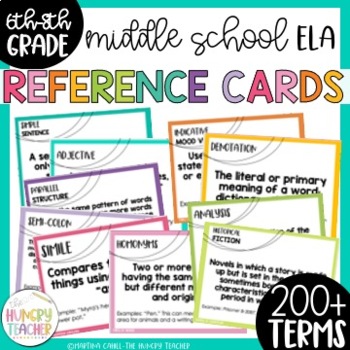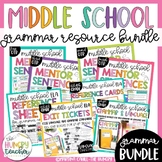Middle School ELA Reference Cards Literature Terms Grammar Terms Writing Terms
Martina Cahill - The Hungry Teacher
35.1k Followers
Grade Levels
6th - 8th
Subjects
Resource Type
Formats Included
- PDF
Pages
60+
Martina Cahill - The Hungry Teacher
35.1k Followers
What educators are saying
Thank you for a wonder set of literary term cards. I plan to use them in games or writing activities, and then hang them up around my room.
I put these on rings and used hook bulletin board pins and placed them on my bulletin board for students to use whenever they need! I love them, and I love that they'll be easy to take down for state testing. Grouping them by type was wonderful too because it helps the students find what they need!
Also included in
- Teach and assess grammar by creating an authentic learning experience with this complete year-long print and digital bundle of middle school mentor sentences and assessment resources. This gramma bundle includes 36 weeks of done-for-you digital and print mentor sentences for each week, teacher grammPrice $74.99Original Price $107.93Save $32.94
Description
The ELA Reference cards for literature terms, nonfiction terms, writing terms, grammar terms, and more for middle school ELA, are great to make a few sets of for your students to reference as needed, or to print and select reference cards for individual students.
.............................................................
This resource is part of a bundle with my ELA reference pages for Middle School ELA
The terms are based on based on the 6th, 7th, and 8th grade Common Core Language, Literature, and Information ELA standards and the terms outlined in each.
This resource has 200+ definition cards in 12 different categories.
LANGUAGE AND GRAMMAR TERMS
- Simple sentence
- Compound sentence
- Complex sentence
- Compound-complex sentence
- Declarative sentence
- Imperative sentence
- Exclamatory sentence
- Interrogative sentence
- Noun
- Pronoun
- Verb
- Adverb
- Adjective
- Preposition
- Conjunction
- Interjection
- Subordinating conjunction
- Coordinating conjunction
- Helping verbs
- Linking verbs
- Subjective pronoun
- Objective pronoun
- Possessive pronoun
- Intensive pronoun
- Reflexive pronoun
- Vague pronoun
- Coordinate adjectives
- Article
- Parallel structure
- Subject
- Predicate
- Clause
- Subordinating (dependent) clause
- Independent clause
- Misplaced modifier
- Nuances
- Exclamation point
- Question mark
- Parentheses
- Quotation marks
- Colon
- Semi-colon
- Apostrophe
- Ellipses
- Dash
- Hyphen
- Period
- Comma
- Simile
- Metaphor
- Hyperbole
- Alliteration
- Onomatopoeia
- Personification
- Idioms
- Allusion
- Adage
- Homophones
- Homonyms
- Homographs
- Synonyms
- Antonyms
- Denotation
- Connotation
- Indicative mood verb
- Imperative mood verb
- Interrogative mood verb
- Conditional mood verb
- Subordinate mood verb
- Gerund verbal
- Participle verbal
- Infinitive verbal
LITERATURE TERMS
- Citing
- Textual evidence
- Analysis
- Explicitly
- Inference
- Theme
- Unbiased
- Plot
- Summary
- Central idea
- Conflict resolution
- Internal conflict
- External conflict
- Character traits
- Characterization
- Point of view
- Narrator
- Figurative language
- Tone
- Mood
- Symbolism
- Flashback
- Irony
- Imagery
- Foreshadow
- Protagonist
- Antagonist
- Scene
- Compare
- Contrast
- Climax
- Suspense
- Cliffhanger
- Flat character
- Round character
- Sympathetic character
- Minor character
- Dynamic character
- Static character
- First-person point of view
- Third-person point of view
- Dialogue
- Genre
- Fiction
- Non-fiction
- Fantasy genre
- Dystopian genre
- Science genre
- Mystery genre
- Mythology genre
- Horror genre
- Memoir genre
- Poetry genre
- Traditional literature genre
- Biography genre
- Auto-biography genre
- Narrative genre
NON-FICTION TERMS
- Rhetorical analysis
- Literary analysis
- Ethos
- Pathos
- Logos
- Euphemism
- Juxtaposition
- Oxymoron
- Parallelism
- Repetition (anaphora)
- Repetition (epistrophe)
- Rhetorical question
- Understatement
- Verbal irony
- Paradox
- Thesis statement
- Topic sentence
- Claims
- Author’s purpose
- Argument
WRITING TERMS
- Argumentative writing
- Supporting claims
- Relevant evidence
- Formal style
- Concluding statement
- Introduction statement
- Informational text
- Exclamatory text
- Definition (writing strategy)
- Classification (writing strategy)
- Compare/Contrast (writing strategy)
- Formation (writing strategy)
- Relevant Facts
- Concrete details
- Transitions
- Precise language
- Domain-Specific vocabulary
- Narrative writing
- Orienting the reader
- Establish a context
- Dialogue (narrative writing)
- Pacing (narrative writing)
- Description (narrative writing)
- Sensory language (narrative writing)
- Informal style
- Writing task
- Writing purpose
- Writing audience
- Planning (writing process)
- Revising (writing process)
- Editing (writing process)
- Publishing (writing process)
- Credibility of Sources
- Quote
- Paraphrase
- Plagiarism
Total Pages
60+
Answer Key
Does not apply
Teaching Duration
Lifelong tool
Report this resource to TPT
Reported resources will be reviewed by our team. Report this resource to let us know if this resource violates TPT’s content guidelines.






